


Who Beats the Funeral Drum?
A Eulogy for Pink Floyd (1967-2000)
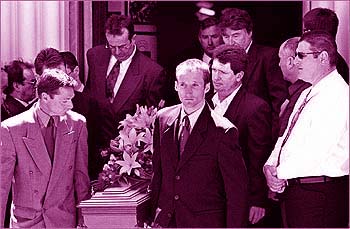 |
We gather today to mourn the loss of a great band. It lived a troubled life, and from its troubles came great music. Its end was rumoured many times, and many times it got back up and made another beautiful album. It could have died young, when Syd Barrett left; but it survived that and became stronger with the adoption of David Gilmour. It could have died right after Dark Side of the Moon, but it still had more to say about its own success and about Syd Barrett on Wish You Were Here.
The Wall was really the beginning of the end. That was the album that saw the tensions between the band members grow too great to overcome. First Rick Wright was eased out, then hired back on a salary to tour. The band put out an album after that without Wright, which may or may not be a Pink Floyd album. Sure, it says, "Pink Floyd" on the cover, but it also calls itself, "A requiem for the post war dream by Roger Waters," that is merely "performed by Pink Floyd." On that album Pink Floyd somehow becomes listed in the credits as Roger Waters' backup band.
After that, Waters left, lawsuits were rumoured, Rick Wright showed up for the Momentary Lapse photo session, and Pink Floyd put out another two albums. There's some good music there, and yet I can't help thinking that no matter how much I like some of the songs, Momentary Lapse and Division Bell just don't hold up as well as that magical string of albums from the seventies. I went to the shows (both Pink Floyd and Waters solo) and bought everything that was put out by the band or individual members. At the time, I thought I had seen Pink Floyd in concert. The shows were amazing, and I guess, technically, I have seen Pink Floyd in concert. But there's always this nagging sense that I missed out on something; that I haven't really seen Pink Floyd because I've never seen Gilmour, Waters, Mason, and Wright on the same stage together. Short of a reunion (don't hold your breath) or a time machine, I'm not ever likely to.
 |
Now Waters and Gilmour are both still doing interesting things, and rumours of solo albums float around once in a while. Gilmour says he's not particularly interested in doing another Pink Floyd album, though, so it seems unlikely we'll get a third Gilmour-led Floyd studio album. Looking back, it seems the band took a long time in passing, and it's hard to tell when it happened. But I think it was in 2000.
2000 was the year that gave us Is There Anybody Out There?, a live Wall recording that came out about twenty years after the studio album. A live recording from the vault was a welcome treat to fans; but it also seemed to be an admission that there was nothing more to say, that it was finally time to bask in the shadows of yesterday's triumph. The Echoes best-of compilation merely confirmed this, and was the first Pink Floyd release that I didn't even bother to buy. Perhaps "Yesterday's Triumph" would have been a more fitting title.
Thankfully, the band never became a parody of itself. It never ended up playing state fairs or college campuses on the way down. It always did things big, and in those tours without Waters, it went out with a bang, not a whimper. It's nice to see Gilmour showcasing the beauty of the music in a small setting, rather than emphasizing the spectacle of the show; and it's nice to see Waters getting his long-overdue recognition and attracting decent crowds (and actually seeming to enjoy touring).
But the Pink Floyd that we knew and love is gone; though it got up after being declared dead in the past, this time it really is gone. Rest in peace, Pink Floyd, and thank you for the music.
The Dark Side of the Dark Side of the Moon
An open letter to the marketing organization that used to be Pink Floyd
Dear Pink Floyd,
I noticed just recently that a new Pink Floyd album cover has just come out. As interesting as the cover art for the 30th anniversary release of The Dark Side of the Moon looks, I think I am one Pink Floyd fanatic that will pass it up. This is not a new experience for me. I still have not bought, nor have I any plans to buy, Echoes The Best of Pink Floyd. Despite the nice album cover art.
This is a tough decision for me. Pink Floyd is such a phenomenal band that you've managed to do for me what few artists have done--turn me into a fanatic. There are a lot of fans out there like me.
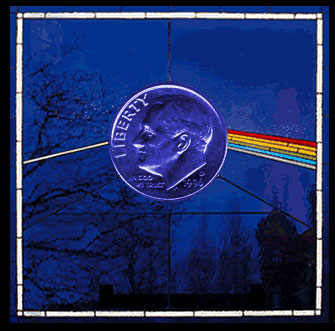 |
In looking over the last decade-and-a-half, I see a lot of activity from you guys. Delicate Sound of Thunder, Echoes The Best of Pink Floyd, p.u.l.s.e, The Shine On 9-CD box set, Zabriskie Point re-release, Is There Anybody Out There?, La Carrera Panamericana, The Dark Side of the Moon 30th anniversary SACD remaster (which I think has much nicer cover art than the 1994 re-release.) And from Roger: The Wall Live in Berlin (video and CD), In The Flesh (DVD and CD). David, you just recently put out your live DVD too.
Why am I, a fan so fanatical that he felt the need to start the very online publication you're viewing now as a conduit to share his love and enthusiasm for your music, having such a hard time being excited by this list of releases? I've bought most of it (twice in some cases.) I've enjoyed all of it. Why has that familiar excitement now been burned down to a barely living ember?
Maybe it's because in looking over the list of "new" releases, I feel the need to whip out that "How many times have I bought 'Comfortably Numb' in the last 12 years" list that I wrote up a while back.
I'd just get depressed. It's a long list.
And who wants to be depressed? I like being a Floyd fanatic, but I also like not being bankrupt over that effort. I liked being a Floyd fanatic when it felt like the band was still attempting to say something. Now I feel like I'm on the receiving end of a massive marketing ploy to keep the name of an otherwise dead band alive. That's pathetic.
I still consider myself that same fanatical fan, but my wallet is pretty worn out at this point. All this activity from a band who has released two new albums in the last decade-and-a-half and two solo artists who have released only one album each in that same period of time. You should all just admit that you can't be bothered to do something new and plant yourselves on some beach somewhere.
You do know what I mean when I say "new," right? I don't mean "new" as in a new release of a live performance of The Wall. Yeah, that's new, but it's a new version of old material. What I mean by "new" is... well, new. New material. New songs. New thoughts and feelings. A new chance to feel the excitement again.
You remember those new albums from way back, don't you? Mixed in there somewhere amongst all these live releases and best of's was an album or two of new music. I'm sure of it. You might vaguely remember them. The titles are on the tip of my tongue... Division something-or-other... blah blah Something Reason... or whatever. Amused to whatever... Broken something-something.
Forgive my lapse of memory. It's been a while.
Am I being too demanding, yet another annoying fan? Is it too much to ask that you, even as you approach your sixth decades, should write and record more songs? Forget the international monster tours. Nobody needs the tours. I know you've spent 30 years doing that and we've heard you loud and clear in both your interviews and lyrics: touring sucks.
So don't tour. Did you forget? You're PINK FLOYD for God's sake! You can skip the tour if you want. What record executive in his right mind would argue with you? And no record executive with any semblance of sanity would turn down a new Pink Floyd (or Roger Waters) album just because there will be no tour. You don't need me to tell you that.
Personally, I don't give a rip about tours anyway. (I love your music, but I can do without most of the "fans" who get drawn to your live shows.) I can understand that the thought of touring must be a somewhat horrifying prospect. Fine. But give us something new perhaps... oh I dunno... maybe more than once a decade? Maybe an occasional album of new material stuffed in between live shows and best of's. Do you think that's a lot to ask of any artist?
I know what you're thinking. "Who's this pathetic sod telling us what to do? What an ingrate!"
And you're right. Who am I to mouth off? Just one amongst millions in that "sea of faces." One of the minority in that group not buying the latest Dark Side cover art or Echoes The Best Of Pink Floyd or the In the Flesh DVD.
Are you curious as to why I haven't bought Echoes?
There are edited down versions of songs on it, that's why. In other words, ruined songs. Ruined songs done for the purpose of what appears to be an ongoing effort to keep the Pink Floyd name alive, despite the apparent rigor mortis that has set in.
The Pink Floyd I fell in love with would never have stood for an edited down version of any of their work. They would have added a third disk to the set at great trouble to themselves and included the whole song (well, they wouldn't have done a run-of-the-mill "best of" in the first place, but that's another issue.)
You know, the "best of" concept would have been wonderful if you had dug up some of those fabled Animals-era shows and included two more CDs in the set with one of those shows on it. The Canadian trio Rush did that with their last live CD. They included a full recording of a current show with a third disk that included a previously unreleased live show from their past and they didn't significantly increase the price on it. That was great, a real gift to their hardcore fans -- exactly the way something like that should be handled.
So how about laying off the onslaught of "new" Pink Floyd and breaking the marketing monotony with some new music? Is that asking too much? I don't think that's too much. And how about some new music all in one shot instead of sprinkling the new material here and there within other projects to get us to buy, or making limp efforts at sprucing up "unreleased" material.
It's embarrassing to see things like "Echoes--contains the never-released 'When The Tigers Broke Free'" or "Is There Anybody Out There? contains the never-released 'What Shall We Do Now?' and some meandering half-baked jam." That's marketing doublespeak. You might be impressing the fans who come to your shows and drunkenly scream for "Money" during the quietest moments of the show, but for fans like me, it's offensive.
That's the kind of ruthless marketing I'd expect from any other artist except you.
Art is a two-way street. I (and other fans) support you; you find time to create something new from time-to-time in return. And no, in my book, rereleasing Pompeii is not new. Releasing a concert performance in any format is not new. I'm talking new material, new music, new words, new expressions. A new reminder of why I'm such a fan of yours.
And no "Comfortably Numb." For once. For the love of God!
Rick Karhu
May 10, 2003
P.S. Well that was pretty heavy, wasn't it? Just to show you that my sense of humor is still intact (and because I harbor no delusions that any of you will ever read this anyway) I'd like to suggest some future marketing opportunities.
31st Anniversary of Dark Side of the Moon
31st 1/2 Anniversary of Dark Side of the Moon
31st Anniversary of Dark Side of the Moon special edition with exclusive button designed by Storm Thorgerson
1st Anniversary of 30th Anniversary of Dark Side of the Moon remaster (so we can relive all those wonderful memories and enjoy the nostalgia of the year before.)
The Numb of the Month Club: join now, and for the low, low price of $9.99 a month, you will receive the latest release of "Comfortably Numb." Why go out each month when the new Pink Floyd album hits the shelves when you can sit back in the comfort of your own home and receive your monthly Numb.
Pink Floyd: The 6-disc Retrospective Set Now With a Cool Poster and Cardboard Cutout Dolls of the Band available soon at a record store near you for a suggested retail price of $129.99!
Comfortably Numb. New unreleased versions of your favorite Pink Floyd song. Includes the instrumental version, the drunk version, the heavy metal version, the sung by the Muppets version, the Andrew Lloyd Webber version, the sung in the shower by Nick's gardener version, the anagram version, and the filled with naughty words version.
The Shadow of Yesterday's Triumph
One fan hopes for a future in which there is still a Pink Floyd
Elliot Tayman was, at one time, one of the most sought-after Pink Floyd experts in the US. In part one of this interview (Spare Bricks #15), Elliot described his memories of discovering Pink Floyd in 1974, and seeing them live in New York in 1975 and 1977. In this issue, we pick up in 1979.
Spare Bricks: By 1979 you were a pretty hardcore fan, I'd guess.
Elliot Tayman: By this time period not only was I a "hardcore" fan, I was an obsessed fan! I was obsessed with the brilliant music of The Pink Floyd, brilliant music which could only be produced by the four individual band members as a whole. Working together as one collective creative force was the only way to give the world the musical masterpieces we all enjoy today. I never was obsessed with any of the band members themselves. To me they're just "ordinary men". It's the music that I worship--not any one particular band member. More to the point, it's the music of a concept album that has always drawn my attention to the idea of its origins.
SB:And The Wall featured the first really cohesive 'story' concept album the Floyd had done.
ET: When I first purchased The Wall on a cold day in late 1979, I couldn't wait to bring it home to play. To this point I had only heard two tracks getting airplay on our local radio stations: "Another Brick in the Wall part 2" and "Comfortably Numb". I yearned to hear the rest of it. After I took one look at the album's plain cover and simple name, I knew I was in for something special. Especially when I opened the gatefold cover to reveal the magnificent artwork which awaited my discovery. I wanted to learn what these drawings had to do with the theme of the album. I knew how the band did things back then. It might have been a simple title and cover, but nothing was simple about this band or their music. After playing the record for a full week, I declared it yet another masterpiece. I loved it!
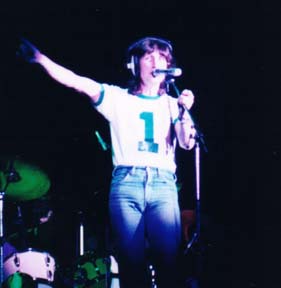 Roger Waters kicks off The Wall at Nassau Coliseum, February 25, 1980. original photos courtesy of Elliot Tayman |
Does the average fan really pay much attention to the story behind the concept album? I suppose not. In 1979 I didn't care what it was about. I cared only about the music. It's the music which makes us say whether or not we like an album. The rest of it is irrelevant to the average fan. But years later I realized the story behind a concept album is just as important as the music itself. I also learned that the character drawings played an important part in the story. The Wall is a perfect example of a concept album.
SB: When you saw The Wall performed in 1980, had the first set of shows in Los Angeles been covered enough that you knew what to expect? Were you hoping for a few of the new songs and a few of the old songs?
ET: I had read only a handful of concert reviews from the band's seven-night stand at LA's Sports Arena earlier that month. So when I went to my first Wall concert on February 25, 1980, I basically knew what to expect. Though I always keep an open mind for a few surprises. But this band was never one for surprises from the concert stage. They always stuck to a setlist. I was not disappointed at all. These concerts were strictly Pink Floyd performing The Wall--"magnificent", "breathtaking", "audience-captivating", "unique historical concerts" are the words that come to this fan's mind.
SB: How did the prolonged 'introduction' go over? Did anyone seem to grasp that this was part of the performance?
ET: I can't speak for the other fans in attendance, but I knew the introduction by Gary Yudman was indeed part of the opening moments of the concerts. Most everyone was chuckling throughout his introductory words of fear and advice.
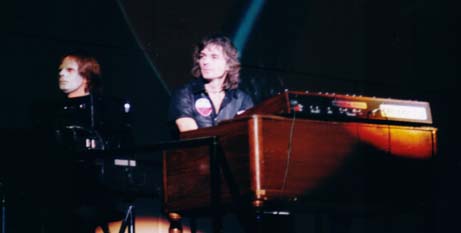 : Pete Woods wearing his Rick Wright mask (left), accompanied by the real Wright. |
SB: How about the surrogate band in their masks? Could you tell it wasn't really the band? And when the real Floyds came out, did anyone seem to 'get' it?
ET: The surrogate band took me by complete surprise and I had to look closely at their masks get the feeling that these guys were not the Pink Floyd. I was correct. Only Waters was up on stage with them, but he was hidden as well. Thinking about the concept of this album, I realized this was a perfect opening to what would later become one of the best concerts I ever had the privilege of attending. Once the Pink Floyd came out on stage in full force, the audience reacted with a roar of enthusiasm. Only the true, dedicated fans understood the meaning of the surrogate band taking the stage first ahead of the Floyd. Most people around me were a bit confused as to what they were seeing. I kept on hearing "Is that Pink Floyd up there?"
SB: Once you realized that they were actually building a wall onstage, and that they were covering up the band in doing so, what were your impressions?
ET: After entering the Nassau Coliseum my eyes were immediately drawn to the stage where I saw a partially-built wall protruding out from the seating area on both sides of the stage. Common sense, as well as the LA reviews, told me this wall was going to be completely built, brick by brick, to form one giant wall across the entire stage. So what would become of the band? Would they play in front or behind the wall? Would the wall be completed by the end of the first half of the concert, or at the close of the show? I already knew what to expect, but I didn't utter a word to my friends who attended these concerts as well--let them be surprised whereas I wouldn't be.
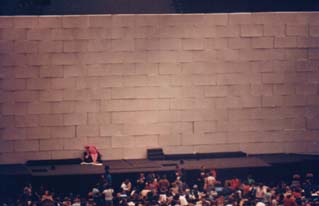 Halfway through the Wall show, the stage was completely hidden behind a wall of cardboard bricks. |
SB: Was there a moment when you thought they just might be ballsy enough to do the entire show unseen from behind a wall? When they 'cheated' by coming out from behind the wall, were you relieved or disappointed?
ET: I knew the band would play the second half of this concert "mostly" in front of the wall. I knew we would get peeks at them that would eventually lead to the entire group coming up on a huge hydraulic platform in front of the stage. No band is ballsy enough to play a good portion of their concert completely hidden from the audience that came to see them perform live. I think if this had happened the fans would have stormed the stage and "torn down the wall" themselves.
SB: David Gilmour's performance of the "Comfortably Numb" solo on top of the wall has been described as one of the greatest moments in live rock history, and certainly one of the Floyd's defining moments onstage. Any recollections?
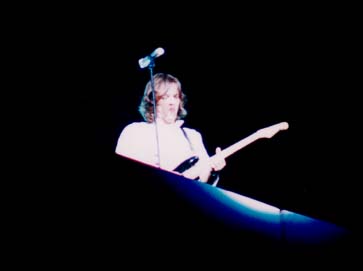 Gilmour atop the wall for "Comfortably Numb". |
ET: As Waters sang the first verse, of Pink Floyd's "greatest hit", I wondered where Gilmour had disappeared to. I soon found out. At the top of the wall, of course! Truly a stunning piece of concert planning. It caught me by surprise as well--not every aspect of these concerts was revealed in the newspapers following their stint in Los Angeles. I was totally in awe as the spotlights shone on Gilmour, revealing his whereabouts. He was almost god-like up there on the wall. His electrifying solo was awesome, to say the least. No other musical moment in this concert could compare to the brilliance of this unique. I would certainly agree with those who say this was one of the greatest moments in live rock history. I've seen over 200 concerts and nothing ever topped this moment.
SB: How about Gerald Scarfe's amazing animations? Any favorites?
ET: The fornicating flowers video sequence is Pink Floyd's best and most well-known part of the visual presentation of these concerts. It is to their visual presentation as Gilmour's "Comfortably Numb" solo is to their music--breathtaking! Equally memorable are the animated sequences shown during the playing of "Goodbye Blue Sky", "The Trial","What Shall We Do Now", and "Waiting For The Worms" with its marching hammer sequence. Videos which will be remembered even a century from today. With the wall being used as the screen, who could ask for anything more? The wall was now completed and it lent itself to being used as the sole video screen for Scarfe's brilliant (yet sometimes frightening) visuals. There was now an enormous amount of energy emanating from the wall and the stage.
SB: And then there were the inflatables--the teacher, the mother, the wife. And inexplicably, the pig. By now it must have seemed like inflatables were just expected of the Floyd. Yet they kept coming up with new ways of making them seem interesting and part of the show. And of course the pig tied show to the 1977 "In the Flesh" tour and the notoriously rowdy crowds in New York and Montreal, which had made Roger want to perform from behind a wall in the first place. You had been in those New York crowds, and here was the band making some reference to the whole thing. Did you or those around you sense the irony? Or was the general opinion little more than a stoned, stunned, "Wow, cool" at the whole affair?
ET: I doubt that the ordinary Floyd fan sensed any sort of irony with the aspects of these concerts. With each new tour, a new generation of fans who had never seen the band perform live were now in attendance. They lacked the previous experiences of any earlier Floyd concerts. There was nothing to compare these new concerts to in the way of older concerts. To them it was just another "wow, cool" concert experience.
For me, however, it was different. I did sense the irony of performing behind a wall. I knew it was Waters' idea to do this and I knew why. After 1977 he wanted to isolate himself from the audience. He felt a growing distance from the fans. He lost the closeness with the audience, which he had felt for so many years prior to 1975. Playing in huge football stadiums is not where "his" music was intended to be performed. He loved the small theatre with its intimate quiet audiences where he could hear a pin drop in the back row.
SB: At the time, did you have any sense that things were beginning to move in a different direction, under the guidance of Roger Waters alone?
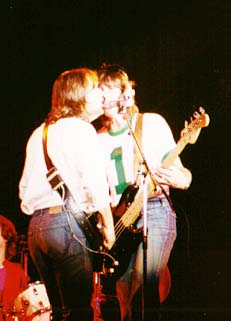 David Gilmour and Roger Waters share a microphone in 1980. |
ET: I personally felt that the band had been moving in a different since Animals. In 1977 I had already sensed a feeling of Waters becoming the band's leader, or at least it's main lyricist. We noticed Waters taking on the role of the lead vocalist which so surprised me since David Gilmour was the band member with the gifted singing voice. Although Animals and The Wall are sensational albums which, in my opinion, couldn't have been produced any better, I was a bit disappointed to see any one band member stand out from the others, taking the spotlight away from the band as a whole.
SB: During the making of The Wall, Rick Wright had been quietly forced out of the group, and producer Bob Ezrin was brought in to help mediate clashes between Gilmour and Waters. Was any of this made known at all? Were there whispers or rumors of any of the band's struggles?
ET: It wasn't until after the album's release that the public learned of the band's near demise during the recording of this album. After the tour was completed Wright was "forced" to resign as a full partner in the group, and he was not involved with the next Floyd album. I can't remember how well this was publicized, but I immediately noticed Wright's name was nowhere to be found on The Final Cut.
I suppose that only a few key individuals close to the group knew of the band's struggles during the making of this album. Bob Ezrin, certainly a main player in the Floyd camp, was brought in to help keep the feuding band members apart. His mediation of the numerous problems that arose during the making of The Wall proved to be invaluable. On the outside, however, his presence wasn't felt. But he sure must have been a major player on the inside. He's an excellent producer as well as a long time friend of the band and their management company.
SB: When the Floyd seemed to be imploding in 1984-1986, what was your take? Did you think it was for the best that they give up? Or did you want more?
ET: I knew that after the release of their 1983 album, The Final Cut, this might well have been an appropriate name for their last and final release of any new material. I thought the band may finally be laid to rest. I felt I had confirmation of this when in 1985 Waters drafted a resignation letter to EMKA and EMI. I never thought the band would continue on without Waters. In fact, without Waters, how could they move forward? He had been the leader of the pack since 1977.
I can't imagine my life without the band being together, even if it was just on paper as a corporation. So I was hoping for a continuation of the music which had become a major part of my life for so many years. I knew a band without Waters would be quite different. Could Gilmour and company carry on in the same grand style which we had all grown accustomed to? I wanted more! I wanted there to be a PINK FLOYD which would still give me something to look forward to from my favorite group. I felt 75% of Pink Floyd would be far better than no Pink Floyd at all!
SB: Was the relative failure of The Pros and Cons of Hitchhiking and About Face albums and tours enough to make you think that Waters and Gilmour would put their differences behind them and work together? Were there any rumors in the rumor mill?
ET: The Waters and Gilmour solo albums and subsequent tours of 1984 may have been a relative failure in terms of sales, but I liked each very much. I still didn't expect any differences between these guys to be patched-up overnight. I felt their working relationships were finished for good, and that they would never again work together on any Floyd albums. A few failures would never be enough to drive them back together. As long as they remain wealthy, there would never be a reunion of any type. To quote Waters himself, "When old bands get back together it's generally for one motivating reason--they need the money!" Still, today's rumors of possible reunions are as strong as they were back in the 1980s. They've never diminished one bit.
SB: When Gilmour announced that Pink Floyd would carry on, did you think that he could pull it off? Or did you believe that the Floyd was dead without Waters?
ET: I was certain that Gilmour and Mason could carry on for one simple reason: Waters lost his ego-driven court battle over the rights to the name 'Pink Floyd' which he so very much wanted to bring to an end. Gilmour, Mason, and even Wright (who was brought back into the band as a paid musician) were free to continue on under the comfortable umbrella and very protecting name of 'Pink Floyd'. The name speaks for itself! It's a powerful name and it's capable of filling football stadiums. I think if just one original band member were to tour under this name, he'd still have no trouble selling out these sized venues for an entire tour.
I did agree with Waters when he stated "The band is no longer a creative force." Especially with his own departure from the band. The music the surviving members would later create would be a far cry from the music we'd all come to love. For me this was hard to believe. Was this the end of the concept album I'd come to eagerly await every few years? Things would never again be the same. The band wasn't "officially" dead without Waters, but to me they were in terms of future musical projects.
SB: Any sense of what other fans (and the press, etc) might have thought about it, and the legal battles between the band?
ET: Everyone in the world of Pink Floyd had access to all the latest news about the court battles being waged in the UK by Waters against Gilmour and Mason over the name of the band. This was pretty much public knowledge as one could read about it almost on a daily basis in all the major British tabloids and other worldwide publications. We didn't have the luxury of the internet back then, but every well-known rock magazine published articles about what was going on behind closed doors. The press were as curious as the fans as to the outcome of one of the most famous court battles in all of rock and roll.
SB: It was during this time that you started working for The Amazing Pudding. How did that come about?
ET: Sometime during 1987 I was browsing through a local record shop when I noticed a copy of The Amazing Pudding on the counter. It caught me by complete surprise. I had no idea there was a Pink Floyd fan club in existence. I purchased the latest issue and signed up for a subscription from the UK. Soon after, I began to get "involved" by writing to the editors and explaining how much I love the music of Pink Floyd. I asked them how I can help with the publication. They asked if I could keep track of articles about Pink Floyd appearing in US newspapers and magazines. They wanted to mention these in the media column of each issue.
But I wanted to do more. I wanted to increase the awareness and circulation of The Amazing Pudding. I sent copies to the various record companies and local radio stations. Eventually I had gotten the publication mentioned on several radio stations. I also convinced a few record shops to carry The Amazing Pudding for retail sale. I then asked my editors for an official position with The Amazing Pudding. Since they already had a US representative they didn't see the need for another person from the US to have an official position. So without their consent I appointed myself their "New York State Representative". I then went to the print shop and had business cards and letterheads made up. When I informed my editors of this they basically said "okay" but asked that I don't make any official statements on their behalf.
Soon after, they realized my full potential. I got The Amazing Pudding mentioned several more times on the radio. Got several more record shops to carry it for sale. Got several friends to sign up for subscriptions. Got The Amazing Pudding reviewed in several rock publications. And even got Columbia and Capitol Records to take notice to the magazine. When I learned our current US Representative was no longer interested in his position, I received a request from my editors to take on the job. I became The Amazing Pudding's US Representative until it's demise in 1993. After this sad occasion, I took on the same role for Brain Damage magazine.
SB: And you also helped a lot of people (radio stations, authors, record companies) writing stories and articles about Pink Floyd?
ET: Simply put, my name was now pretty well-known in regards to Pink Floyd. My name is basically "on file" with radio stations and record companies. When a radio station is putting together a show on Pink Floyd, I usually get a phone call asking for input and advice. Most often it's the usual question of what songs do you think we should play? When an author is writing a book or article on Pink Floyd, I usually get a phone call or letter asking me for assistance. Most often the request begins with the need to use my photos of the band within their book or article. This comes about because the record companies simply send them my way. They're aware of how much I enjoy being involved with all things Pink Floyd. In addition, I own a very large personal Pink Floyd collection which in itself is a great source of information these very people like to tap.
Because of my eagerness to help, I've often received invitations from the record companies to attend Pink Floyd press or launch parties. For instance, in 1993 Capitol Records sent me an invitation to attend their launch party for the 20th anniversary edition of Dark Side of the Moon, which took place in Hollywood. Unfortunately due to the great distance I would have to travel, I decided not to attend.
In 1995 I received an invitation from Columbia Records to attend the launch party for the release of PULSE. The party was located on the 80th floor of the Empire State Building here in New York City. The top portion of the building was transformed with the help of red spotlights to actual pulsate like the blinking red LED light on the CD case. One of our local radio stations broadcasted the Dark Side portion of the CD in sync to a series of green laser beams shooting out from the 78th floor. The party-goers got a chance to see this since there were very large screens on the 80th floor where we were able to view what was going on outside.
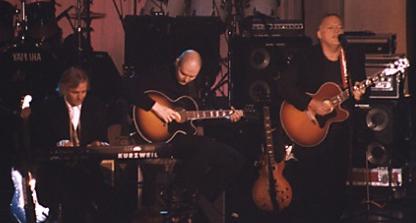 Rick Wright and David Gilmour perform with Billy Corgan at the Floyd's induction to the Rock and Roll Hall of Fame. (Photo by Elliot Tayman) |
In 1996 I was invited to witness Pink Floyd's induction ceremony into the Rock And Roll Hall Of Fame which takes place at New York's Waldorf-Astoria Hotel. I had press credentials which allowed me to bring my camera and photograph the band onstage playing "Wish You Were Here". Unfortunately, both Roger Waters and Syd Barrett were not able to attend this historic event.
Certainly one of the high points of my long involvement with Pink Floyd was in 1995 when I was contacted by the publicity director of Capitol Records. She explained to me that she had received a phone call from a producer at "Entertainment Tonight". She went on to say "Entertainment Tonight" was putting together a Pink Floyd special, and they were looking to interview a big fan, a collector, a representative from the fan club, and a historian on the band. She told the producer, "Have I got the person for you! He's all of the above and he's very receptive to being involved with anything Pink Floyd." She told me to expect a phone call from the producer. A few days later I did receive that much-anticipated phone call. We had a brief discussion concerning my background and arranged a date for the interview.
A few days later, a four-man film crew arrived at my home. Once in the room I call my "Pink Floyd museum", their eyes were drawn to all the memorabilia I have from floor to ceiling. They spent ten minutes looking at everything prior to setting up the equipment for the interview. The interviewer asked questions pertaining to how I first discovered the music, how and why I began to collect, and how I became involved with the fan club. My answers were brief but direct to the point. I did get the sense that all four of them were indeed fans as well. I could tell just by looking at their faces when they first entered my museum. All of them were in their 20s and 30s and were bobbing their heads as they filmed me sitting in a chair listening to The Dark Side Of The Moon and reading the lyrics on the inside of its cover.
SB: I'm sure you saw the Floyds again in 1987 and 1994.
ET: I witnessed two concerts at Madison Square Garden and two concerts at New Jersey's Brendan Byrne Arena in October 1987. In the summer of 1988, I saw them once at New Jersey's Giants Stadium, and twice at Nassau Coliseum. The five concerts at Nassau Coliseum were added on to the tour to accommodate the filming for Delicate Sound of Thunder.
In 1994 I saw the band perform in three countries. First was at Yankee Stadium in New York for two concerts. Then I flew up to Toronto, Canada for a show there, and then once more back at Giants Stadium. And, finally, I flew across the Atlantic Ocean to see a concert in Holland--my favorite country outside of the United States.
SB: So you got to see Dark Side again? How did it compare to 1975?
ET: On July 17, 1994 at NJ's Giants Stadium I witnessed a complete performance of The Dark Side Of The Moon. There was no comparison whatsoever to the first time I witnessed this in 1975. There was just too much "extra" music emanating from the stage where there wasn't just the Floyd, but a whole host of assorted musicians to help 'fill the gaps', so to speak. It didn't sound original, especially during the final two tracks, where the absence of the original singer (Waters) was very evident
SB: What was your impression of the post-Waters Floyd's performances? Spectacle for spectacle's sake? Or something more--something original and exciting?
ET: Whether or not Waters was still in the band, the post-Waters concerts were still a spectacle to see. Lots of great music and a wonderful, exciting visual presentation awaited every concertgoer. They weren't the same Pink Floyd I had grown up with, but as I had earlier mentioned, any Pink Floyd is still better than no Pink Floyd at all. I enjoyed all the concerts I had seen during those turbulent years.
SB: Any opinion about all these 'recycle rereleases'--remasters, remixes, the live Wall release, the DVD rereleases, etc? Are they flogging a dead horse, or are they doing something with artistically valid?
ET: Some of the new things to come out are certainly well worth the investment to own. The Wall live release is one of them. It's absolutely outstanding! I suppose Waters himself finally heard the outcry from the fans for twenty years. Everyone wanted this to be issued. More fans didn't get a chance to see these concerts as opposed to the ones who did. I could listen to this live album everyday.
The same is true for the DVD release of The Wall movie. It's clarity and sharpness makes one want to throw away the VHS version released some years ago. With 5.1 surround sound, lots of extras, etc., why wouldn't the Floyd fan want to own this?
I'm not one to go out and buy all the remixes which have been issued over the last ten years or so. But some are worth the trip to the CD shop. If it truly sounds better, then go out and buy it! If you've got a stereo system where you can hear a big difference then by all means you should own the very best issues of these releases. Especially in the way of the new 30th anniversary CD edition of The Dark Side of The Moon. This fan is getting an SACD player and a surround-sound speaker system just so he can enjoy this new release!
But at times it would seem that both EMI and Columbia Records were trying to "milk" the fans of their precious wages. How many different singles does one have to own? I'd have to say the record companies were targeting the collectors who would purchase every little variation. I know--I was one of these collectors for 27 years!
SB: Would you like to see come back to life again in terms of new music, or are you content that they just fade into history?
ET: I always hold out hope for any new music from Pink Floyd. The band isn't officially "knocked on the head" just yet. One never knows what the future may hold in terms of our beloved band. Fading into history is what old actors do. The Pink Floyd are no actors!
I welcome any solo albums or live performances that might come with this. It gives me something to look forward to. I just want to be able to say that there is still "activity" within the band. I want to say the band is still alive.